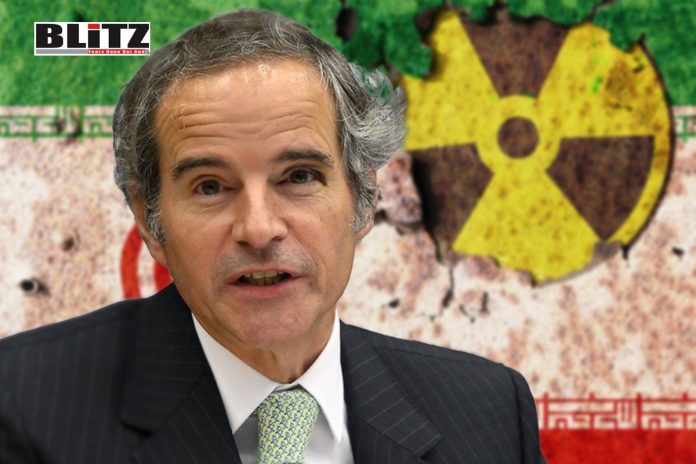It appears that the world’s endeavors to restrain Iran’s nuclear program have faltered. This observation underscores a global system that seems to be losing its strength. Despite concerted efforts to curb nuclear proliferation, they have fallen short, potentially signaling to other nations with ambitions for nuclear armament. The repercussions of this failure could trigger a dangerous resurgence in nuclear competition, posing grave threats to global peace and security.
The reasoning behind this conclusion lies in the reluctance of Western powers to condemn Iran for its lack of cooperation with the UN’s nuclear watchdog, fearing it may exacerbate current geopolitical tensions. In anticipation of its upcoming board of governors meeting, the International Atomic Energy Agency (IAEA) disclosed that Iran’s collaboration with the agency remained deficient on numerous critical matters concerning its nuclear program, which Iran insists is solely for peaceful purposes. The agency’s quarterly report highlighted Tehran’s expansion of nuclear activities, the deactivation of the IAEA’s surveillance devices monitoring Iran’s nuclear program remotely, and Tehran’s continued refusal to permit field visits by senior agency inspectors.
The E3 group, comprised of France, Germany, and the UK, initially intended to rebuke Iran for its non-cooperation and had prepared a resolution for that purpose. However, amidst the intricate geopolitical landscape marked by events in Ukraine and Gaza, the group opted to set aside the resolution. They concluded that the current climate was not conducive to criticizing Tehran.
The decision of Western powers to refrain from escalating tensions with Iran is perceived by many in the Middle East as a form of appeasement towards Tehran. This approach, over the years, has only served to bolster and embolden Iran, fostering its continuous assertiveness in the Middle East and beyond.
In a recent statement, IAEA Director-General Rafael Grossi expressed alarm over the “loose talk” emanating from current and former Iranian nuclear program officials. He reiterated concerns about the potential risks of nuclear proliferation in the Middle East. While Grossi clarified that he possesses no evidence suggesting Iran is actively developing nuclear weapons, he underscored the significance of closely monitoring the rhetoric of Iranian officials who boast about their country’s nuclear capabilities.
During a statement commemorating the 45th anniversary of the Iranian revolution last month, Ali Akbar Salehi, the former chief of the Atomic Energy Organization of Iran, asserted that his nation had surpassed all milestones in nuclear science and technology. Salehi hinted at Tehran’s purported ability to fabricate all essential components for “the car,” a veiled reference to a nuclear bomb, suggesting that assembly is the only remaining step.
In nuclear terminology, enriching uranium to 60 percent marks a significant advancement towards reaching the 90 percent threshold necessary for constructing a nuclear weapon. Such enrichment levels far exceed the 3.67 percent limit agreed upon with Tehran in the 2015 Iran nuclear deal, also known as the Joint Comprehensive Plan of Action (JCPOA). Following the unilateral withdrawal of the United States from the JCPOA in 2018 under President Donald Trump’s administration, Iran gradually deviated from its obligations under the agreement. Despite efforts by the European Union in the summer of 2022 to coax Iran back into compliance with the deal, negotiations failed to materialize, preventing Washington from rejoining the agreement.
Over time, containing Iran has proven challenging, revealing the shortcomings of international diplomacy and the weakness of global institutions amidst an increasingly divisive world. This polarization is evident in the contrasting visions of peace, security, and prosperity, with Western nations aligned on one side, and a loose coalition including Russia, China, and several Global South nations, such as Iran and North Korea, on the other.
Although criticized for its failure to fully address Iran’s regional destabilization efforts, the Iran nuclear deal was initially perceived as a step towards curtailing Tehran’s nuclear ambitions. Recent events, particularly those surrounding the Israeli-Palestinian conflict, highlight Iran’s influential yet deniable role in the region, often exerted through proxies, such as disrupting shipping traffic in the Red Sea.
.UN Security Council Resolution 2231 served as the enforcement mechanism for the Iran nuclear deal, imposing limitations on Iran’s nuclear program, missile production, arms trade, and conventional weapons arsenal. It introduced “sunset clauses” spanning from 2020 to 2041, in exchange for the removal of US and EU sanctions. Notably, restrictions on Iran’s missile program expired in October 2023, while the use of advanced centrifuges for uranium enrichment is slated to be permitted from July 2024. Even the UNSC resolution itself, enabling “snapback” sanctions, is scheduled to lapse in January 2026.
Despite the JCPOA’s intentions, it appeared ineffective in curbing Iran’s tactics to bypass its provisions. Tehran actively circumvented restrictions concerning the testing, development, construction, and delivery of missiles and drones. The sanctions regime proved only marginally successful, as many sanctioned individuals and entities merely shifted roles, while shell companies continued to procure items for Iran’s prohibited weapons projects.
The world witnessed Iranian drones and missiles striking Kyiv via Moscow, along with attacks on cargo vessels in the Red Sea by the Houthis, while Hamas’ missile capabilities, bearing Iran’s military support, became apparent. The recent report by the IAEA underscores the failure of containment efforts. Moreover, the Vienna meeting highlighted the inadequacies of the current international order. Iran’s actions suggest a disregard for accountability, thriving in a world where power dictates norms. In this increasingly polarized and fragmented world, impunity is becoming the norm.




